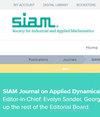Solving Nonlinear Ordinary Differential Equations Using the Invariant Manifolds and Koopman Eigenfunctions
IF 1.8
4区 数学
Q2 MATHEMATICS, APPLIED
引用次数: 0
Abstract
SIAM Journal on Applied Dynamical Systems, Volume 23, Issue 1, Page 924-960, March 2024.Abstract. Nonlinear ODEs can rarely be solved analytically. Koopman operator theory provides a way to solve two-dimensional nonlinear systems, under suitable restrictions, by mapping nonlinear dynamics to a linear space using Koopman eigenfunctions. Unfortunately, finding such eigenfunctions is difficult. We introduce a method for constructing Koopman eigenfunctions from a two-dimensional nonlinear ODE’s one-dimensional invariant manifolds. This method, when successful, allows us to find analytical solutions for autonomous, nonlinear systems. Previous data-driven methods have used Koopman theory to construct local Koopman eigenfunction approximations valid in different regions of phase space; our method finds analytic Koopman eigenfunctions that are exact and globally valid. We demonstrate our Koopman method of solving nonlinear systems on one-dimensional and two-dimensional ODEs. The nonlinear examples considered have simple expressions for their codimension-1 invariant manifolds which produce tractable analytical solutions. Thus our method allows for the construction of analytical solutions for previously unsolved ODEs. It also highlights the connection between invariant manifolds and eigenfunctions in nonlinear ODEs and presents avenues for extending this method to solve more nonlinear systems.
利用不变曲率和库普曼特征函数求解非线性常微分方程
SIAM 应用动力系统期刊》,第 23 卷第 1 期,第 924-960 页,2024 年 3 月。 摘要非线性 ODE 很少能用解析法求解。库普曼算子理论提供了一种在适当限制条件下求解二维非线性系统的方法,即利用库普曼特征函数将非线性动力学映射到线性空间。遗憾的是,找到这样的特征函数非常困难。我们介绍了一种从二维非线性 ODE 的一维不变流形构建 Koopman 特征函数的方法。这种方法一旦成功,我们就能找到自主非线性系统的解析解。以前的数据驱动方法使用库普曼理论来构建在相空间不同区域有效的局部库普曼特征函数近似值;而我们的方法则能找到精确且全局有效的解析库普曼特征函数。我们演示了解决一维和二维 ODE 非线性系统的 Koopman 方法。所考虑的非线性示例对其标度-1 不变流形都有简单的表达式,并能产生可行的解析解。因此,我们的方法可以为以前未解决的 ODEs 构建解析解。它还强调了非线性 ODEs 中不变流形与特征函数之间的联系,并提出了扩展该方法以求解更多非线性系统的途径。
本文章由计算机程序翻译,如有差异,请以英文原文为准。
求助全文
约1分钟内获得全文
求助全文
来源期刊

SIAM Journal on Applied Dynamical Systems
物理-物理:数学物理
CiteScore
3.60
自引率
4.80%
发文量
74
审稿时长
6 months
期刊介绍:
SIAM Journal on Applied Dynamical Systems (SIADS) publishes research articles on the mathematical analysis and modeling of dynamical systems and its application to the physical, engineering, life, and social sciences. SIADS is published in electronic format only.
 求助内容:
求助内容: 应助结果提醒方式:
应助结果提醒方式:


